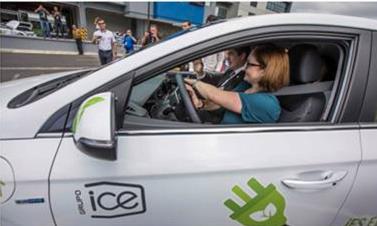In order to travel 220 kilometers in a conventional vehicle, at least ₡ 15,000 (US$ 25) are required in gasoline; but in an electric car, that amount is reduced to only ₡ 1,200 (US$ 2) of a load. The economic savings is one of the advantages of this type of cars since the replacement of renewable electric energy by hydrocarbons means an estimated saving of 75%.
The Costa Rican Electricity Institute (ICE) acquired a vehicle fleet (by substitution) of 100 vehicles that move with electric power. Its autonomous load allows you to travel up to 220 kilometers.

To load this type of vehicle, Hyundai Ionic 2019, it takes 4 hours in case the load is made in the house, but if you go to an ICE fast charging station, only 20 minutes will be enough.
Those who have nightly rate will pay US$ 2 for every 220 kilometers, and with normal residential rate, the cost is ₡ 4,000 (US$ 6.6).
One of the ICE vehicles was tested, on a route from La Sabana to Quepos. This type of cars do not have muffle, are 0-polluting emissions, they do not make noise when turning on or off and each time the speed decreases, the load is “regenerated”.
Currently, the recharge of energy in the vehicles at L2 stations of ICE is free and are located in Jacó, Alajuela, Sabana Norte, Guápiles, Limón, Liberia, Cuatro Cruces – Guanacaste, Puntarenas, Quepos, and San Isidro del General.

